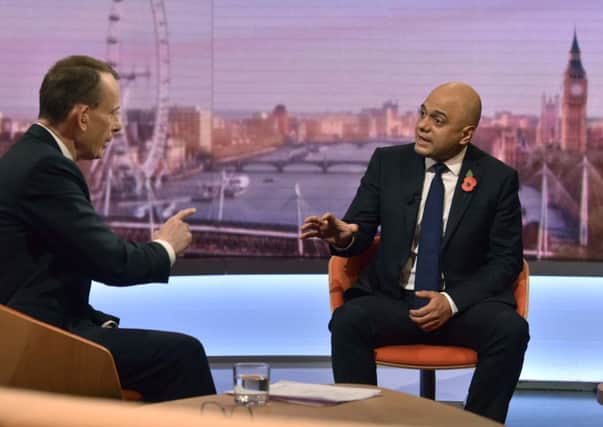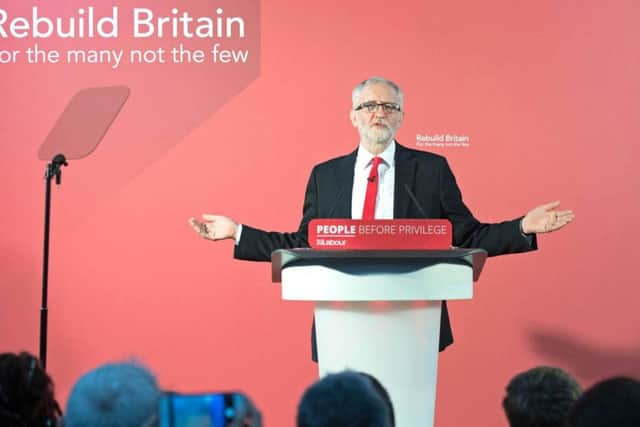Brexit Britain is charging into the Valley of Debt. What could go wrong? – Bill Jamieson


Sunny uplands, social betterment and optimism: what’s not to like in this most extraordinary of election campaigns? Are we not sorely in need of these?
Get Brexit Done! Billions more for the NHS. Budget boosts for social care. Giant infrastructure projects to transform road and rail and lift growth and productivity. Radical action on climate change. Shorter working hours. A lift in the minimum wage. More police. More doctors. A month still to go and I cannot recall an election so brimful of transformational change and promise.
Advertisement
Hide AdAdvertisement
Hide AdAfter three-and-a-half years of Brexit wrangling, we’re surely long overdue a burst of sunny optimism from the parties.


But let’s get real. What could possibly go wrong after December 12? Here are some mega tripwires we are likely to face.
Let’s start with “Get Brexit Done” – arguably the most misleading election slogan of all time. Far from settlement and resolution, the realistic prospect is of years of detailed negotiation on trade deals ahead.
EU negotiator Michel Barnier has raised fears of a ‘no-deal’ Brexit at the end of the 14-month extension period after suggesting that future trade negotiations might require more than three years of talks.
Can we really expect an upsurge in business confidence and investment while these remain unresolved?
Inflation permanently tamed?
Or take the impressive consensus that it’s now safe to spend and borrow on a scale not seen for decades. This rests on some heroic assumptions: that inflation will remain subdued at historically low levels; that ultra-low interest rates will stretch out for years ahead; and that the global economic and political environment will remain benign, lifting exports and trade.
Market expectations of UK short-term interest rates are astonishingly low. Over five years they are just below the current 0.75 per cent level. Have we ever had it so good? The government can borrow for ten years at a rate of just 0.7 per cent – and for 50 years at 1.1 per cent!
As for inflation, currently 1.5 per cent, this is assumed to be permanently tamed at below two per cent – effectively meaning that the government can finance massive projects at negative real interest rates.
Advertisement
Hide AdAdvertisement
Hide AdBut how often in the past have inflation and interest rates stayed loyal to pundit prediction? Back in 2008-09, the near-universal assumption was that ultra-low interest rates were a temporary emergency.
Ten years later, they’re still with us – and not always for our economic betterment. Many debt-soaked companies are still locked in a Zombie-style existence.
Blind election optimism
Earnest predictions in the wake of the 2007-08 financial crisis did not prove true. Recession and soaring unemployment were widely predicted. They didn’t happen. It is not just that economic forecasting has proved so often fickle and in need of continual revision as circumstances change.
In more than 40 years of covering economic and financial markets, I have learnt one thing only is constant: the ability of movements in rates and inflation to surprise and catch us out.
Forecasts of rock-bottom borrowing costs stretching out for 50 years? Who really believes this will be the case? That this time it’s different?
Is it really safe to assume that a resort to levels of public debt and borrowing not seen for decades will not push up aggregate demand and inflation? That there will be no labour shortages or anxiety among overseas lenders and buyers of government debt?
We know also of logistical problems over-ambitious projects such as Crossrail and HS2, hospital building and PFI projects that soared above cost estimates. But in the blind rush of election optimism, it was the vision of sunny uplands that drove us forward. Election campaigns can seek to suspend our disbelief.
Spend and borrow for “investment” is now the universal cry. But what is “investment” exactly? Sajid Javid pledges to spend on road and rail – a re-wording of Gordon Brown’s “golden rule” only to fund “investment” across the economic cycle and never to fund day-to-day spending.
Advertisement
Hide AdAdvertisement
Hide AdBut today, “investment” is one of the most elastic words in the political lexicon. It defies definition. John McDonnell includes higher public sector salaries (“investment in people”). More social care? The same. Nationalisation? More investment. State ownership of the energy grid should not, he argues, be a net cost if the state gets a revenue-generating asset. But there will be an avalanche of pressure for cheap fares and stronger union rights. Investment?
What is the antidote to this? We need not sink into pessimism. But we can guard against the worst of despair by being alert to false hope. The valleys of bleak disappointment are never deeper than when plunging from the peaks of promises that prove strewn with glossed-over hazards and unforeseeable dangers.